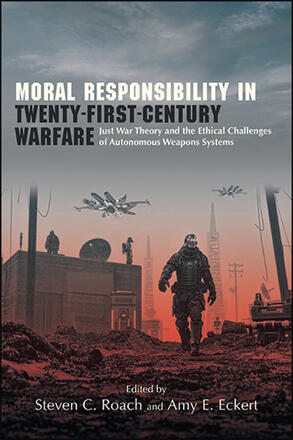
Moral Responsibility in Twenty-First-Century Warfare
Just War Theory and the Ethical Challenges of Autonomous Weapons Systems
Alternative formats available from:
Confronts the ethical challenges of warfare carried out by artificial intelligence.
Description
2021 CHOICE Outstanding Academic Title
Moral Responsibility in Twenty-First-Century Warfare explores the complex relationship between just war theory and the ethics of autonomous weapons systems (AWS). One of the challenges facing ethicists of war, particularly just war theorists, is that AWS is an applicative concept that seems, in many ways, to lie beyond the human(ist) scope of the just war theory tradition. The book examines the various ethical gaps between just war theory and the legal and moral status of AWS, addresses the limits of both traditional and revisionist just war theory, and proposes ways of bridging some of these gaps. It adopts a dualistic notion of moral responsibility—or differing, related notions of moral responsibility and legitimate authority—to study the conflicts and contradictions of legitimizing the autonomous weapons that are designed to secure peace and neutralize the effects of violence. Focusing on the changing conditions and dynamics of accountability, responsibility, autonomy, and rights in twenty-first-century warfare, the volume sheds light on the effects of violence and the future ethics of modern warfare.
Steven C. Roach is Professor of International Relations at the University of South Florida. He is the author of Decency and Difference: Humanity and the Global Challenge of Identity Politics and Critical Theory of International Politics: Complementarity, Justice, and Governance. Amy E. Eckert is Professor of Political Science at Metropolitan State University of Denver. Her books include Outsourcing War: The Just War Tradition in the Age of Military Privatization and The Future of Just War: New Critical Essays (coedited with Caron E. Gentry).
Reviews
"…Moral Responsibility in Twenty-First-Century Warfare is a valuable addition to the study of AWS and JWT that answers important ethical questions of modern warfare. " — Perspectives on Politics
"The volume contributes significantly to an ever-expanding discussion of war, just war, violence, and moral responsibility … Highly recommended. " — CHOICE
"This book wrestles with issues that are timely and relevant. " — Todd Burkhardt, author of Just War and Human Rights: Fighting with Right Intention
"Expertly written, this volume offers new ways to think through the ethics of broad theoretical concerns such as the legitimation of moral authority and the challenges to identifying the proper locus of moral responsibility in warfare, as well as provides applied-ethics analyses of different aspects of lethal autonomous weapons systems. " — Eric A. Heinze, University of Oklahoma